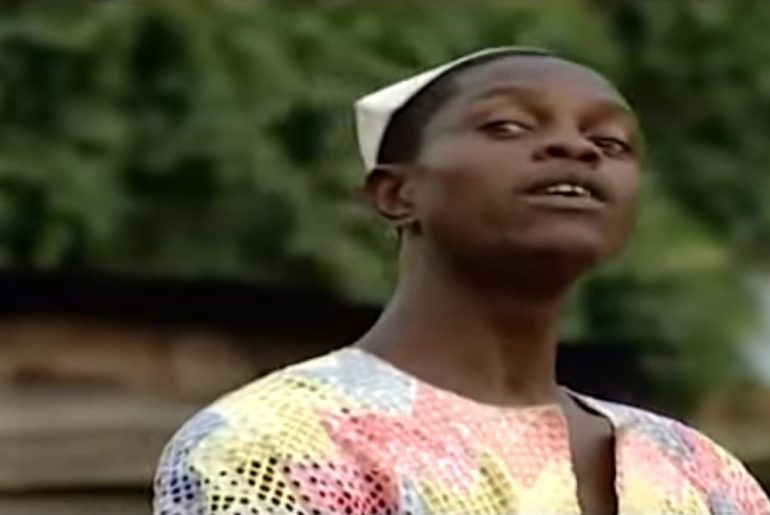First Published On FEBRUARY 7, 2020
It’s common knowledge that the whodunit-mystery genre is undergoing a low-key revival on big screens lately. First there was Kenneth Branagh’s Murder On the Orient Express (2017) followed by Kyle Newacheck’s Murder Mystery (2019) on Netflix, Rian Johnson’s critically acclaimed crowd pleaser Knives out (2019) and a forthcoming Death on the Nile (2020) adaptation. Back home, we had Catch.er by Walt Banger released in 2017 to favourable reviews. Even within our indigenous movie circuits, Yoruba especially, there’s been an interesting resurgence of uniformed policemen with coloured character traits trying to make sense of mysterious murder cases.
But before all these (the mysterious demise of the genre and the gradual resurgence), there was Owo Eje, a murder mystery movie directed by Yemi Amodu and released in 2005, that caused quite a stir within the Yoruba audience. Adapted from a Kola Akinlade novel published in 1976, Owo Eje retains elements fans of the genre have come to expect and love: the mysterious death, the peculiar detective/protagonist, the pool of suspects, the red herrings, the foreshadowing, the motives, the tensed interrogations and the slow, methodical unmasking of the ultimate culprit.
There’s a lot to like about Owo Eje; the star-studded cast and impeccable performances, the high entertainment value, the homage to the rich Yoruba culture and much more. But there are three aspects that truly stand out.
1. Theme
Most movies claim to have some theme running underneath and across. But it is said that the best movies don’t just pay lip service to themes like most do, but find ways to make the theme the running thread that connects every single makeup of the story. In Owo Eje, we see the theme of greed breathing life into characters and motivations; linking just about everything (the characters, the soundtrack, the world) into one coherent whole. What this does is to elevate it from just another murder mystery flick to a subtle commentary about the sad state of society. This appears to be a strength of most Nigerian movies in the past: The rooting of seemingly generic drama in human dilemmas that provide meanings beyond what’s seen and heard.
2. Dialogue
In Owo Eje, dialogue is a strength. Not only are the words spoken by characters ruled by economy, they stay true to the characters by making it feel real enough to relate to, and poetic enough to elevate it above boring everyday conversation. Sule Ebira’s dialogue not only retain inflections and drawls that reveal his ethnic allegiance but also show the carelessness, greed, gluttony and self-centered traits that rule his life.
Akin Olusina. Source: Film
The same can be said for Chief Olowojeunjeje, Baba Wale and the enigmatic detective, Akin Olusina. These characters have distinct dialogue styles that are memorable in themselves. For example, Akin Olusina’s bloated confidence and charisma is communicated through his animated, heavy handed as-a-matter of fact style of speaking; and the skillful use of proverbs. What Owo Eje teaches us is to think of dialogue not as the mere lyricism of spoken words but an opportunity to explore and reveal character.
Sule and his new bicycle. Source: Film
3. Plot
This is perhaps the strongest point of Owo Eje. The beauty of murder mystery plots are the numerous distractions intended to confuse the audience and aid the gratifying effect of the ultimate reveal. One minute, sinister looking Mister A is the prime suspect then suddenly, the meek looking Miss B has her true motives unearthed and she becomes the prime suspect. And just when we are starting to catch our breaths, piece puzzle pieces in our bead and outsmart the director and writer, the rug is pulled from under our feet as the true killer, the maniac hiding in the shadows beyond plain sight, is exposed.
Baba Wale. Source: Film
In Owo Eje, after the mysterious death of the greedy Sule Ebira, we are faced with a thicket of suspects with varied motives for commiting murder. Chief Olowojeunjeje was extorted by Sule earlier on the film and always looked bound to redeem his bruised ego at some point. Jossy, Sule’s good friend, could also have killed his friend out of jealousy of his recent success as a Cocoa farmer and the purchase of a brand new bicycle. Lana, a criminal wanted by the police, also throws himself into the mix by making the strange gesture of offering Sule a cigarette the same night he died. Akin Olusina interviews these suspects and the motives are spelled out but he remains unconvinced. He goes on combing for the truth. And eventually, thanks to inspiration provided in a couple of scenes heavy with traditional underpinnings, he is able to connect the murder to the unassuming Baba Wale. It’s a shocking twist, one not as heavy handed as, say, Scorsese’s Shutter Island or Bryan Singer’s The Usual Suspects but it works.
By employing exposition laced with comedy, without unnecessarily forcing events to connect (a tactic employed by writers feeling smart), Baba Wale is exposed in a very satisfying ending.


Leave a Reply